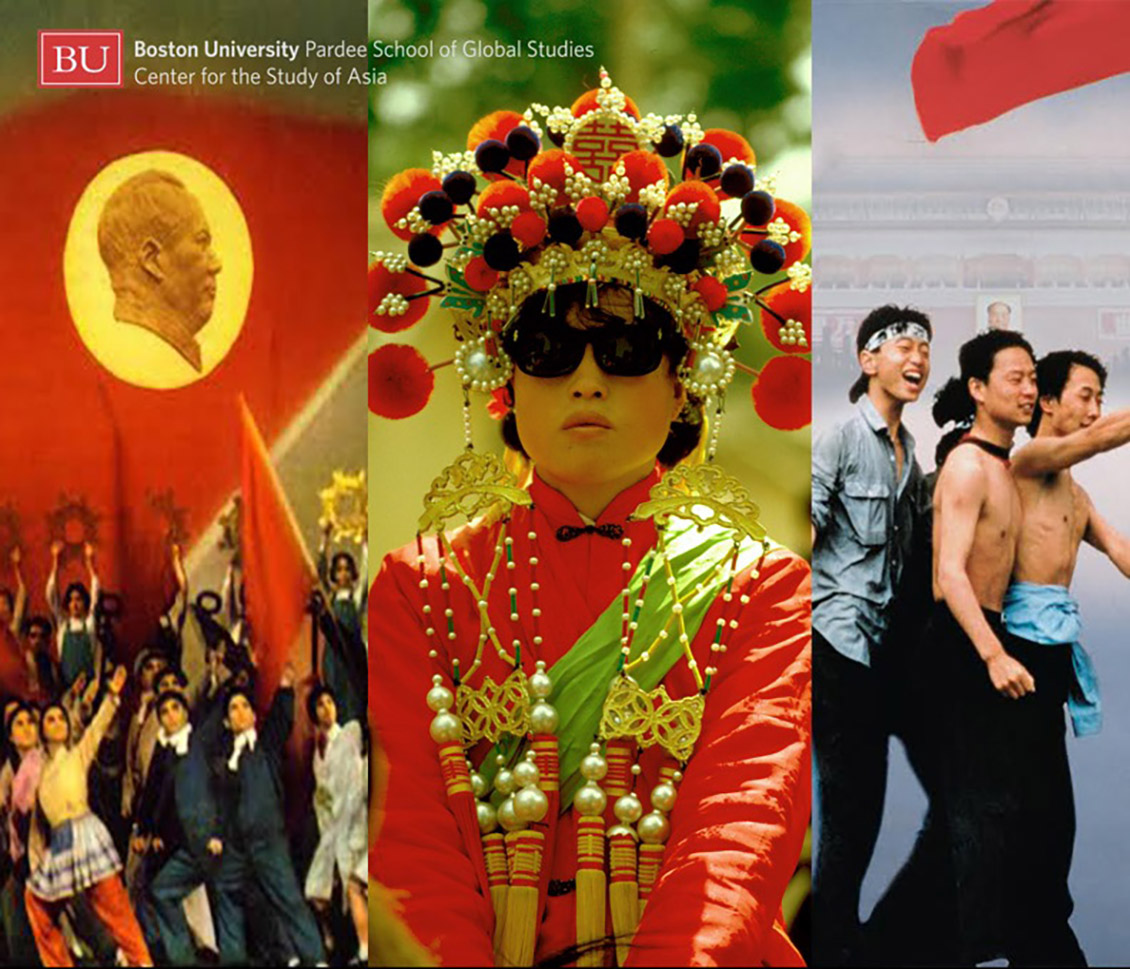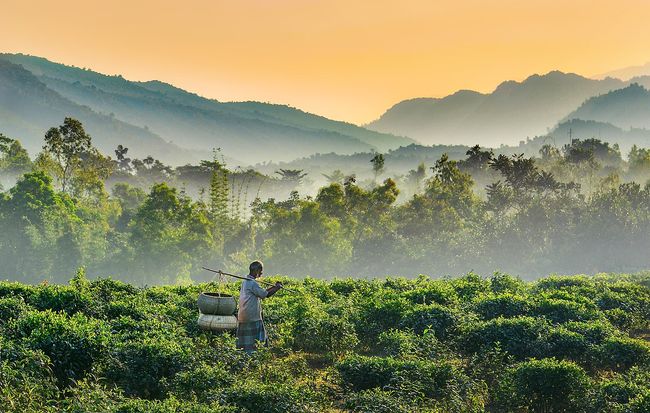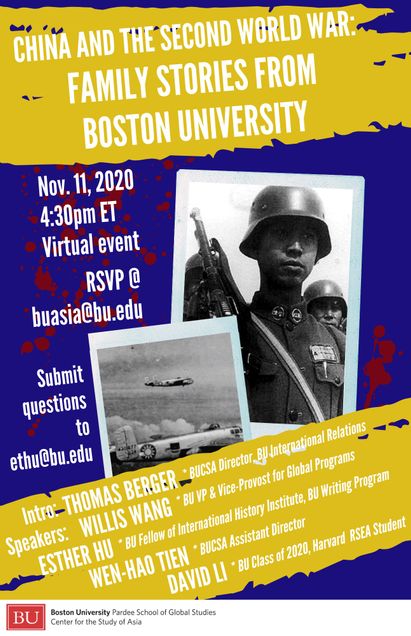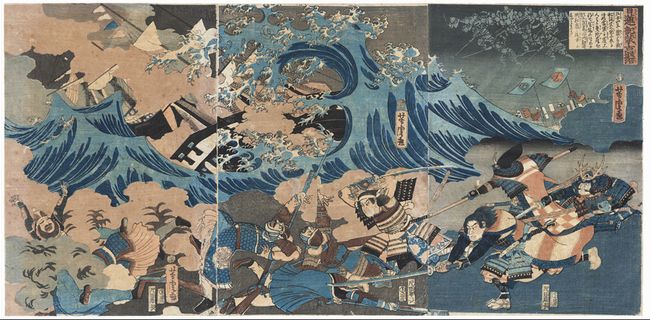History in Images, History in Words: In Search of Facts in Documentary Filmmaking
History in Images, History in Words:
In Search of Facts
in Documentary Filmmaking
A lecture by Carma Hinton
Robinson Professor of Visual Culture and Chinese Studies at George Mason University
Monday April 10, 2017 from 4-7 pm
at the Photonics Center (9th fl.), 8 St. Mary’s Street, Boston University
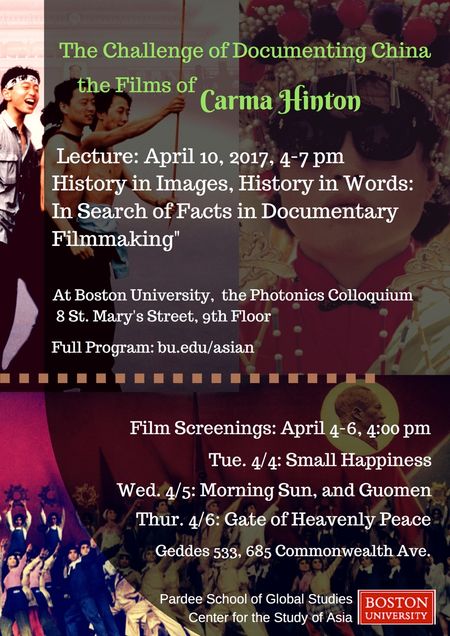 My presentation will focus on the process of documentary filmmaking, especially the many challenges my team and I faced in trying to create engaging filmic narratives that are both factually accurate and encompass multiple perspectives. I will use excerpts from my films as well as out-takes to illustrate the difficulties in determining what information to include and exclude, assess the compromises involved in the choices, and explore the consequences of taking various possible paths. I will also address the different problems that a historian encounters when presenting history in images as opposed to in words: the potential and limitation of each medium and what information each might privilege or obscure. I believe that in this age of “alternative facts” and “parallel universes,” reflections on the challenges in obtaining authenticity and truth and the importance of relentlessly striving to reach this goal, take on particularly urgent meaning.
My presentation will focus on the process of documentary filmmaking, especially the many challenges my team and I faced in trying to create engaging filmic narratives that are both factually accurate and encompass multiple perspectives. I will use excerpts from my films as well as out-takes to illustrate the difficulties in determining what information to include and exclude, assess the compromises involved in the choices, and explore the consequences of taking various possible paths. I will also address the different problems that a historian encounters when presenting history in images as opposed to in words: the potential and limitation of each medium and what information each might privilege or obscure. I believe that in this age of “alternative facts” and “parallel universes,” reflections on the challenges in obtaining authenticity and truth and the importance of relentlessly striving to reach this goal, take on particularly urgent meaning.
About the speaker:
Carma Hinton is an art historian and a filmmaker. She received her Ph.D. in Art History from Harvard University and is now Robinson Professor of Visual Culture and Chinese Studies at George Mason University. Together with Richard Gordon, Hinton has directed many documentary films, including Small Happiness, All Under Heaven, To Taste a Hundred Herbs, Abode of Illusion: The Life and Art of Chang Dai-chien, The Gate of Heavenly Peace, and Morning Sun. She has won two Peabody Awards, the American Historical Association’s John E. O’Connor Film Award, the International Critics Prize and the Best Social and Political Documentary at the Banff Television Festival, and a National News & Documentary Emmy, among others. Hinton is currently working on a book about Chinese scrolls depicting the theme of demon quelling. Carma Hinton was born in Beijing. Chinese is her first language and culture.

Empires of the Senses: Bodily Encounters in Imperial India and the Philippines, with Andrew Rotter (Dec. 15, 2020)
The Frederick S. Pardee School of Global Studies and BU Center for the Study of Asia are pleased to invite you to the next online event of the Decolonization@ 60 Series
Decolonization Book Talk #3
Tuesday, Dec. 15, 2020, 10:00- 11:30 AM EST
Empires of the Senses: Bodily Encounters
in Imperial India and the Philippines (Oxford, 2019)
· With Author Andrew Rotter (Colgate University)
· and Discussants Chris Capozzola (MIT) on the Philippines;
Ben Siegel (Boston University) on India
Register for Book Talk #3 here
About the Speakers:
Andrew Rotter is Charles A. Dana Professor of History at Colgate University, 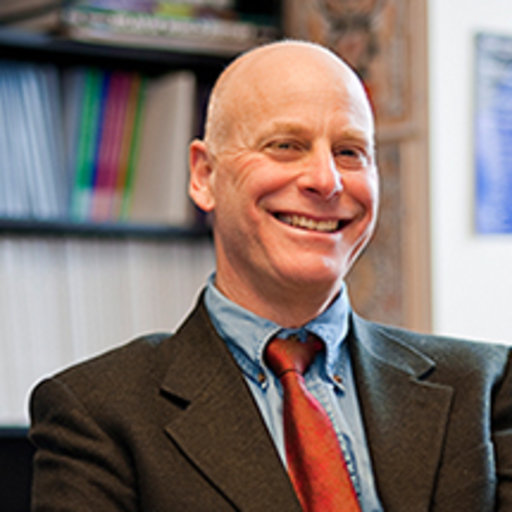 where he has taught since 1988. He has a BA from Cornell University, where he worked with Walter LaFeber, and a Ph.D from Stanford, where he was trained by Barton Bernstein, David Kennedy, and Alexander George. He has published The Path to Vietnam: Origins of the American Commitment to Southeast Asia, Comrades at Odds: The United States and India, 1947-1964, and Hiroshima: The World's Bomb, along with articles, essays, and reviews in Diplomatic History, The American Historical Review, The Journal of American History, and other journals. His most recent book is called Empires of the Senses: Bodily Encounters in Imperial India and the Philippines (Oxford, 2019).
where he has taught since 1988. He has a BA from Cornell University, where he worked with Walter LaFeber, and a Ph.D from Stanford, where he was trained by Barton Bernstein, David Kennedy, and Alexander George. He has published The Path to Vietnam: Origins of the American Commitment to Southeast Asia, Comrades at Odds: The United States and India, 1947-1964, and Hiroshima: The World's Bomb, along with articles, essays, and reviews in Diplomatic History, The American Historical Review, The Journal of American History, and other journals. His most recent book is called Empires of the Senses: Bodily Encounters in Imperial India and the Philippines (Oxford, 2019).
DISCUSSANT ON THE PHILIPPINES
Christopher Capozzola is Professor of History and Section Head at MIT,  where he teaches courses in political and legal history, war and the military, and the history of international migration. From 2015-2017 he served as the Secretary of the Faculty, and in 2018 was named a MacVicar Faculty Fellow, MIT’s highest honor for undergraduate teaching. His research interests are in the history of citizenship, war, and the military in modern American history. His first book, Uncle Sam Wants You: World War I and the Making of the Modern American Citizen (Oxford University Press, 2008), examines the relationship between citizens, voluntary associations, and the federal government during World War I. In 2010, Uncle Sam Wants You won the Lois P. Rudnick Book Prize of the New England American Studies Association. His most recent book, Bound by War: How the United States and the Philippines Built America’s First Pacific Century, was published by Basic Books in July 2020.
where he teaches courses in political and legal history, war and the military, and the history of international migration. From 2015-2017 he served as the Secretary of the Faculty, and in 2018 was named a MacVicar Faculty Fellow, MIT’s highest honor for undergraduate teaching. His research interests are in the history of citizenship, war, and the military in modern American history. His first book, Uncle Sam Wants You: World War I and the Making of the Modern American Citizen (Oxford University Press, 2008), examines the relationship between citizens, voluntary associations, and the federal government during World War I. In 2010, Uncle Sam Wants You won the Lois P. Rudnick Book Prize of the New England American Studies Association. His most recent book, Bound by War: How the United States and the Philippines Built America’s First Pacific Century, was published by Basic Books in July 2020.
DISCUSSANT ON INDIA
Benjamin Siegel, Assistant Professor of History at Boston University, is a 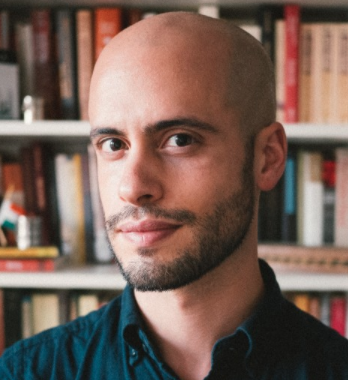 historian whose transnational archival work places South Asia at the center of global economic, environmental, and political transformations. His first book, Hungry Nation: Food, Famine, and the Making of Modern India (Cambridge University Press, 2018), interrogated the ways in which questions of food and scarcity structured Indian citizens’ understanding of welfare and citizenship since independence. Professor Siegel’s current book project, Markets of Pain: A Transnational History of the United States Opioid Crisis, is under contract with Oxford University Press.
historian whose transnational archival work places South Asia at the center of global economic, environmental, and political transformations. His first book, Hungry Nation: Food, Famine, and the Making of Modern India (Cambridge University Press, 2018), interrogated the ways in which questions of food and scarcity structured Indian citizens’ understanding of welfare and citizenship since independence. Professor Siegel’s current book project, Markets of Pain: A Transnational History of the United States Opioid Crisis, is under contract with Oxford University Press.
4th International Conference on Bangladesh Environment (ICBEN-4) announcement
Announcement and Call for Papers
4th International Conference on
Bangladesh Environment (ICBEN-4)
December 26-27, 2020 Online Conference
Bangladesh Poribesh Andolon (BAPA) and Bangladesh Environment Network (BEN) are pleased to announce the 4th International Conference on Bangladesh Environment (ICBEN), to be held as on online conference on December 26-27, 2020.
For more than two decades, BAPA and BEN, together with other pro-environment forces of the country, have been waging a relentless campaign for the protection of Bangladesh’s and global environment. Many successes have been achieved. However, reversing the overall trend of environmental deterioration remains a challenge. As a part of this on-going struggle, BAPA and BEN hold annual conferences on specific environmental issues. Every few years, they also hold comprehensive international conferences, popularly abbreviated as ICBEN, covering all major issues of Bangladesh environment as well as important issues of global environment. Previous ICBENs were held in 2000, 2002, and 2010. ICBEN-4, to be held this year, will also mark the 20th anniversary of the founding of BAPA. ICBEN-4 therefore will also take stock of the progress achieved thus far, and chart out the future course of action.
Scope and Topics of ICBEN-4
The scope of ICBEN-4 covers all important environmental issues of Bangladesh. For convenience, these have been classified into following six groups:
|
Climate change and disaster management
|
Forests, biodiversity, and indigenous peoples |
|
Rivers, floodplains, and wetlands
|
Urbanization and rural planning |
|
Energy and environment
|
Gender dimension of environmental issues |
|
Coastal and marine environment |
Grassroots movements: youth, labor, women and others |
|
Pollution control and waste management
|
Economic, legal, and management issues |
|
Health and food safety |
Government, political parties, and civil society |
Call for Papers
Papers are invited on the above topics for presentation at ICBEN-4. The timeline for papers is as follows:
Submission of the Abstract: Deadline November 20, 2020
A substantive 300-500 words abstract stating the title of the paper, name of the author(s) with institutional affiliation(s), and e-mail addresses is required.
Abstract Acceptance: November 25, 2020
Full Paper submission: December 10, 2020
In view of the late announcement, some flexibility will be allowed regarding the deadlines above. All abstracts and papers should be sent electronically in Word format to the following persons:
A) Papers written by authors residing in Bangladesh:
Prof. Shahidul Islam, Department of Geography & Environment, Dhaka University, Ramna, Dhaka. Email: shahidul_bd@yahoo.com
B) Papers written by authors residing outside of Bangladesh:
Dr. Ahmed Badruzzaman, Haas School of Business, University of California, Berkeley, CA, USA. Email: ahmed.badruzzaman@berkeley.edu
A selection of papers presented at ICBEN-4 will be published in the conference proceedings after necessary editorial process. A special volume of the selected papers is also planned for a peer-reviewed journal.
Dual Format
Following the tradition of BAPA-BEN conferences, ICBEN-4 will have a dual format, with “Expert Sessions” for presentation of papers by scientists and scholars and “General Sessions” for presentation by leaders, activists, and representatives of different sections of the society, including direct victims of environmental degradation. To have appropriate representation in the General Sessions, conference organizers will reach out to various environmental organizations; conservation movements; political parties; professional organizations; trade unions; grassroots/civic organizations; organizations for women, youth, students; cultural and sports organizations; and other relevant organizations and individuals.
Organizers of the Conference
Also following the tradition of past ICBENs, BAPA and BEN will invite universities; research institutions; environmental organizations; conservation movements; and other pro-environment organizations to join ICBEN-2020 as co- and associate organizers.
Conference Office
BAPA office at 9/12 Lalmatia, Block D, Dhaka 1217, will serve as the office of ICBEN-2020. The office may be contacted by phone at 02-58152041 and by e-mail at bapa2000@gmail.com.
Circulated by:
Dr. Mohd. Abdul Matin, Member Secretary,
Conference Organizing Committee (COC), ICBEN-4
Phone: 880 181 922 3343, E-mail: memory14@agni.com
Visit BEN's website at "http://www.BEN-Global.org" and its current archive at "http://www.listserv.emory.edu/archives/ben.html". For comments and queries, please send e-mail to "ben.editor@yahoo.com".
Mapping Christianity in China, 1550-1950 (Nov. 19-21, 2020)
Participate in our ONLINE WEBINAR WORKSHOP on
Developing Relational and Geospatial Tools for the Study of Christianity in China
On November 19-21, 2020 (Thursday, Friday, and Saturday) the Boston University Center for Global Christianity and Mission will convene a workshop on “Mapping Christianity in China, 1550-1950: Developing Relational and Geospatial Tools for the Study of Christianity in China.”
The full schedule is available here.
Here are some details to help you decide if you want to join and what to expect:
1. The China Historical Christian Database (CHCD) is exiting its proof-of-concept phase. We are convinced that mapping when and where every Christian church, school, hospital, monastery, orphanage, publishing house, and the like, were located in China will be a boon to scholarship. We have also discovered that by identifying the foreigners and Chinese who worked inside each Christian building, we can recreate quite elaborate social network maps. The CHCD is opening new ways to study Christianity and its place in modern China. If you have not done so already, look at the website. The short demo video summarizes what the CHCD can do in its proof-of-concept state.
2. The goal of this workshop is to think strategically about the future of the 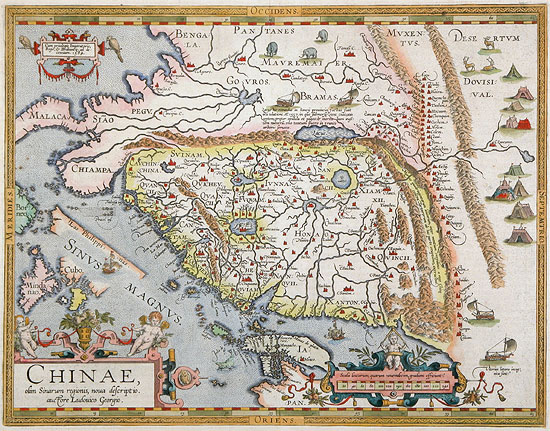 CHCD. What happens next? How can it best serve scholarly and general audiences? To answer these and other questions, we have assembled leaders from multiple fields.
CHCD. What happens next? How can it best serve scholarly and general audiences? To answer these and other questions, we have assembled leaders from multiple fields.
3. The program is divided over three days. The first two days will have 90-minute parallel sessions. You can select which panel is most interesting to you, or you can move in and out of the two different Zoom rooms to catch particular talks that appeal to you. We will be in a webinar format, so your picture will not be visible. In other words, you will be able to come and go without disrupting others. We hope that gives you the freedom to listen to what is most important to you. The full schedule is downloadable HERE, so you can begin to map out your priorities. Please note that all times are listed according to the time in Boston, US Eastern Standard Time. [EST 8:30 to 10:30 AM = Europe: + 5 or 6 hours; East Asia: + 13 or 14 hours]
4. At the end of the parallel sessions, everyone will reconvene for a plenary 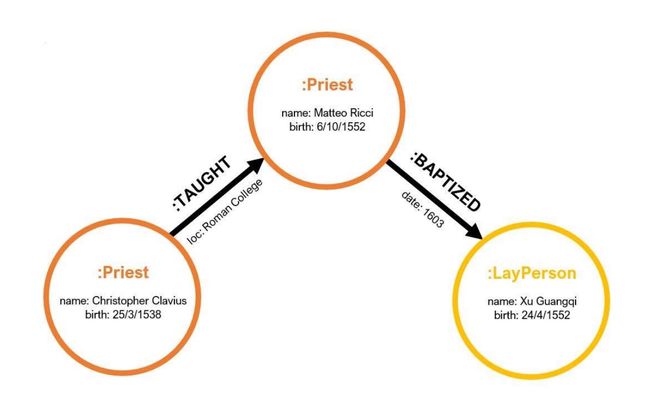 conversation. Rapporteurs, who will be embedded in each Zoom webinar, will briefly summarize what they heard and ask the first questions. We then hope to have a spirited time of reflection on the Digital Humanities and the possibilities of the China Historical Christian Database. You will have a Q&A box in Zoom in which you can send the moderator questions or comments. This is a great opportunity to participate.
conversation. Rapporteurs, who will be embedded in each Zoom webinar, will briefly summarize what they heard and ask the first questions. We then hope to have a spirited time of reflection on the Digital Humanities and the possibilities of the China Historical Christian Database. You will have a Q&A box in Zoom in which you can send the moderator questions or comments. This is a great opportunity to participate.
5. The third day is designed to generate concrete suggestions. You will be invited to self-select a theme that interests you, and you will work in a small group to generate ideas and suggestions for how the CHCD can move forward. Because that day is collaborative, we will be meeting in the regular Zoom format, so you can see, speak, and text with others in the room. The proceedings will be RECORDED and eventually made available to those who will expressly request a link to watch them.
6. If you register, you will be sent a document that has all the Zoom links embedded in it. You will be able to use that to navigate the parallel, plenary, and small group sessions. If you are able to attend part or all of the virtual event, you will need to register at http://www.bu.edu/cgcm/2020/11/09/mapping-christianity-in-china/
If you have any questions or concerns, please let us know. Clarity will only enhance our time. You can reach the CHCD team members at cgcm@bu.edu
Sincerely,
CHCD Principal Investigators
Daryl IRELAND (Boston University)
LIU Xian (Renmin University)
Alex MAYFIELD (Boston University)
Eugenio MENEGON (Boston University)
Click here to see the project White Paper
PLEASE RSVP FOR THIS ONLINE WORKSHOP USING THE FORM BELOW:
Sorry. This form is no longer available.
China and the Second World War: Family Stories from Boston University (Nov. 11, 2020)
On Veterans Day (November 11, 2020) at 4:30 pm
BU Center for the Study of Asia
Is Pleased to host
a virtual program open to the entire community, including families.
Sorry. This form is no longer available.
Orthodox Passions: Rewriting the History of Emotions in Late-Imperial China (Tuesday, Nov. 17, 2020)
Boston University World Languages & Literatures Lecture Series
New Books in East Asian Literature
Annual Theme for 2020-2021: Kinship, Sexuality, and Emotions
Orthodox Passions: Rewriting the History of Emotions in Late-Imperial China
Professor Maram Epstein
Professor of Chinese Literature, and Director,
Center for Asian Pacific Studies, University of Oregon
Tuesday, November 17, from 4:00 pm to 5:30 pm (EST) via Zoom
Please register by clicking this link:
https://bostonu.zoom.us/meeting/register/tJUrde2prjIvG9wBkSQnhbJ0wwnicUB0PiZv
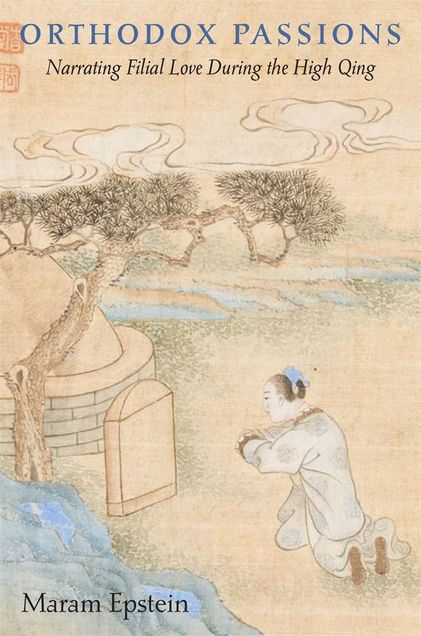 The basic goal of Orthodox Passions: Narrating Filial Love during the High Qing (Harvard University East Asian Series, 2019) is to decenter romantic love as the normative translation
The basic goal of Orthodox Passions: Narrating Filial Love during the High Qing (Harvard University East Asian Series, 2019) is to decenter romantic love as the normative translation
of qing 情 in histories of Chinese emotion. By drawing on a wide range of sources that go beyond the usual cult of qing canon, I seek to challenge the May Fourth paradigm that continues to frame filial piety as a repressive ritual obligation that undergirded the despotic system of government and social order in imperial China. May Fourth attempts to produce an enlightenment modernity created the useful fiction of a monolithic feudal tradition that needed to be discarded, and filial piety was just one of the many traditional values that was declared to have no place in the modern. This view has been so dominant that for most of the twentieth and twenty-first centuries late-imperial formations of filial piety have received little critical attention. Orthodox Passions reframes the current understanding of filial piety by arguing that it should be understood not as an externally imposed set of ritual practices but as a deeply interiorized emotion that functioned similarly to love in the European west in articulating a self with affective and ethical agency. In addition to giving an overview of the book and its interdisciplinary methodology, I will discuss its implications for analyzing the embrace of the modern concept of “love” 愛 in China’s early 20th century.
About the speaker:
Research
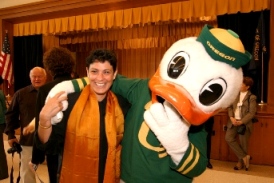 Prof. Epstein's research has been focused on reading Ming-Qing novels within their specific cultural and aesthetic contexts. Although my approach to late-imperial fiction is grounded in the intellectual and cultural context of the period and refers to traditional commentaries for immediate “reader response,” the questions I ask are largely informed by recent critical concerns, particularly in the area of gender theory. My first book, Competing Discourses, analyzes the shifting fictional representations of gender and sexual desire from within the context of the neo-Confucian discourse of self-cultivation and the late-Ming cult of qing (sentiment). She argues that a poetics of gender based on yin yang numerology is an essential structural element in many Ming-Qing novels.
Prof. Epstein's research has been focused on reading Ming-Qing novels within their specific cultural and aesthetic contexts. Although my approach to late-imperial fiction is grounded in the intellectual and cultural context of the period and refers to traditional commentaries for immediate “reader response,” the questions I ask are largely informed by recent critical concerns, particularly in the area of gender theory. My first book, Competing Discourses, analyzes the shifting fictional representations of gender and sexual desire from within the context of the neo-Confucian discourse of self-cultivation and the late-Ming cult of qing (sentiment). She argues that a poetics of gender based on yin yang numerology is an essential structural element in many Ming-Qing novels.
Prof. Epstein is now pursuing several linked projects concerning ritual, expression of emotions, the body, and representation of self. She spent eight months in the Number One Historical Archives in Beijing collecting legal records of domestic violence. She is also looking at the various representations of filial piety in legal records, fiction, and autobiographical writings. As in her earlier work, her goal is to uncover how the self is represented in different discourses and to tease out the implications of various narrative cliches that continue to shape the cultural imaginary of contemporary China.
Publications
Competing Discourses: Orthodoxy, Authenticity, and Engendered Meanings in Late-Imperial Chinese Fiction. 2001, Harvard University East Asian Series.
“Inscribing the Essentials: Culture and the Body in Ming-Qing Fiction.” Ming Studies 41 (1999): 6-36.
“Reflections of Desire: The Poetics of Gender in Dream of the Red Chamber.” Nan nu 1.1 (1999): 64-106.
“Engendering Order: Structure, Gender, and Meaning in the Qing Novel Jinghua yuan.” Chinese Literature: Essays, Articles, and Reviews 18 (December 1996): 105-131.
from: https://eall.uoregon.edu/profile/maram/
Sponsored by the BU Center for the Humanities, Department of World Languages & Literatures, and BU Center for the Study of Asia
For more information about this event, please visit
http://www.bu.edu/wll/2020/10/21/wll-lecture-series-new-books-in-east-asian-literature-11-17/
China, Global History, and the Sea: BUCSA faculty contribute to special issue of Education About Asia
We are pleased to draw your attention to the newly published set of articles on
China's maritime history produced collaboratively by
Grant Rhode, Thomas Kennelly, Eytan Goldstein, William Grimes,
Eugenio Menegon, and Robert Murowchick
for the Fall 2020 issue of the journal Education About Asia, published by the Association for Asian Studies. Their contribution "China, Global History, and the Sea: Pedagogical Perspectives and Applications"
can be read by clicking on this link:
with online supplement electronic links are as follows:
Mongol Case Study:
https://www.asianstudies.org/wp-content/uploads/Case-Study-Mongol-Invasions-of-Northeast-Asia-1.pdf
Mongol Case Study Guide:
https://www.asianstudies.org/wp-content/uploads/Study-Guide-Mongol-Invasions-of-Northeast-Asia.pdf
Sidebars: Visuals and Selected Reading:
https://www.asianstudies.org/wp-content/uploads/RhodeFall2020EAAOnlineSupplement.pdf
This special issue of Education About Asia focuses on Teaching Asia's Giants: China, and includes:
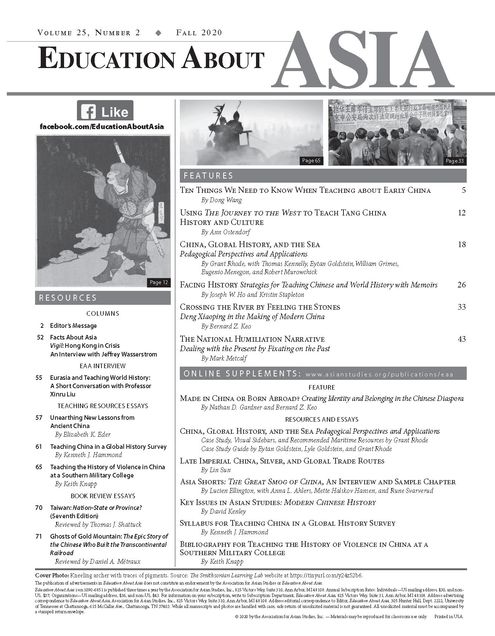
Education About Asia, edited by Lucien Ellington, is published by the Association for Asian Studies.
Additional information can be found at AAS Education About Asia website.
University of Oxford China Centre seminar: The Invisible City: A Global Microhistory of Europeans and their Social Networks in 18th c. Beijing (Thursday, 29 Oct)

BU Prof. of History Eugenio Menegon will present
The Invisible City: A Global Microhistory of Europeans
and their Social Networks in Eighteenth Century Beijing

AN ONLINE PRESENTATION
Thursday 29 October 2020, 12:30 PM GMT [UK] = 8:30 AM Boston EST time
(online, via MicrosoftTeams)
Please register here and you will receive details on how to join the event.
Please direct your queries to: giulia.falato@orinst.ox.ac.uk
The study of the Catholic mission in Beijing is an ideal arena to uncover the deep structures of Chinese-Western socio-cultural and economic relations in early modern times. This presentation focuses on the Qing imperial court, where missionaries worked as scientists and artisans, seen as an urban microcosm, a node in a vast planetary network, and the site of informal social networks. The missionaries nested within these networks to pursue their interests (primary for them, evangelization), and stubbornly resisted bureaucratic control and autocratic hegemony, using their professional skills and gift-giving to obtain patronage. The historical experience of these individuals behind the public façade of power humanizes and nuances the claims of grand political and economic narratives, from the ‘Great Divergence’ between China and the West, to Qing state building. Through this group, we can expand the analysis to a larger network of individuals and institutions (also using digital scholarship approaches), extending from the Qing court to the entire world.
 About the speaker:
About the speaker:
Eugenio Menegon teaches Chinese and global history at Boston University (USA). His 2009 book Ancestors, Virgins, and Friars: Christianity as a Local Religion in Late Imperial China centred on the life of Catholic communities in Fujian province between 1630 and the present. His current project is an examination of the daily life and political networking of European residents at the Qing court in Beijing during the 17th-18th centuries.
Making Potstickers with Master Chef Fred Chang! (Oct. 17, 2020)
Are you ready to make some delicious gourmet food? 

BUTASA (Boston University's Taiwanese American Student Association)
is hosting a virtual masterclass cooking event featuring
Fred Chang, MasterChef S10 Top 10,
Saturday, October 17, 2020 at 1:00 pm ET on Zoom

For additional details, see
https://m.facebook.com/events/333531787944786
To read about Master Chef Fred Chang (BU SHA '17), see this story and his websites:
https://dailyfreepress.com/2019/10/18/bu-alum-fred-chang-dishes-on-his-masterchef-experience/
Learning from Past Pandemic Governance: Early Response and Public-Private Partnerships in Testing of Covid-19 in South Korea
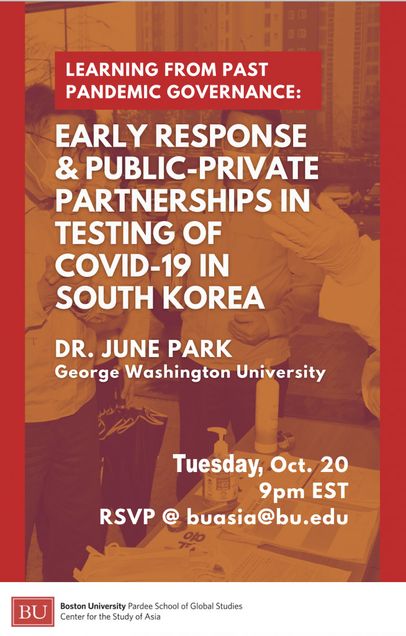 Tuesday, October 20, 2020 at 9:00 pm ET
Tuesday, October 20, 2020 at 9:00 pm ET
Speaker: June Park, PhD (George Washington University)
Moderator: Professor William W. Grimes (Boston University)
How can political elites learn from the past to enhance sustainability of their leadership in a pandemic situation? How did South Korea’s large-scale COVID-19 testing work, and what was the role of the South Korean in-vitro diagnostics (IVD) industry? Learn all about it through this BUCSA webinar as June Park (George Washington University/National Research Foundation of Korea) presents findings from her latest publication with Eunbin Chung (University of Utah) in the special issue on ‘Pandemics, COVID-19, Sustainability and Development’ in World Development. The publication offers a theoretical framework of policy implementation that combines collaboration between public and private sectors (“Public-Private Partnership,” or PPP) to efficiently deal with urgent crises such as COVID-19. The authors explain the role of new institutions prompted by policy failure precedence (Time 1: Middle East Respiratory Syndrome in 2015) that at a later time period (Time 2: COVID-19 in 2020) allow for the activation of PPPs with the aim to extend the political life of incumbent leaderships.
About the Author:
Dr. June Park is an East Asia Voices Initiative Fellow of the East Asia National Resources Center at the George Washington University Elliott School of International Affairs. She is also a Next Generation Researcher at the National Research Foundation of Korea for her first book manuscript, ‘Trade Wars & Currency Conflict: China, South Korea and Japan’s Responses to U.S. Pressures since the Global Financial Crisis,’ and she is working on her second book project, ‘Europe's Challenges & Responses: Between Faustian Bargains with China and U.S. Pressures since Brexit’. Using a framework of institutional variance, her first book manuscript attempts to answer why the three countries have not acted in the same way upon encountering U.S. protectionism, and provides a mechanism for predicting policy moves. Her second book project also utilizes the framework of institutional variance to examine the varied policy responses from Germany, France and the UK post-Brexit to China and the U.S. in the era of geo-economic conflict and artificial intelligence. Her writings have appeared in peer-reviewed publications such as World Development and Asian Perspective, as well as policy-oriented publications such as The Diplomat and East Asia Forum.
Please fill out the RSVP form below to receive the Zoom meeting link.
Sorry. This form is no longer available.
Manjari Chatterjee Miller co-edits Routledge Handbook of China-India Relations

Congratulations to
Prof. Manjari Chatterjee Miller and her co-editors Kanti Bajpai and Selina Ho,
on their recent publication of the
Routledge Handbook of China–India Relations

For details, see https://lkyspp.nus.edu.sg/news-events/events/details/maintaining-peace-in-china-india-relations-a-discussion-and-a-book-launch
"The China-India relationship is one of the keys to international security, the future of Asia, and the well-being of nearly 3 billion people. Since early May 2020, border tensions between the two powers have underlined the potential for conflict between them. In 2017, their armies faced off for 73 days. At the same time, they have built a system of engagement designed to manage conflict and their larger rivalry. Their leaders meet regularly, they hold talks on the border quarrel, they have a series of confidence building measures, and they trade and invest with each other. They also cooperate multilaterally.
What are the drivers of the relationship? How can they manage conflict and rivalry? Are there cooperative steps forward, now and looking ahead?
Two years ago, the Centre on Asia and Globalisation, Lee Kuan Yew School of Public Policy, National University of Singapore, set out to answer these and other vital questions by working with Routledge UK to produce the Routledge Handbook of China-India Relations (https://www.routledge.com/Routledge-Handbook-of-ChinaIndia-Relations-1st-Edition/Bajpai-Ho-Miller/p/book/9781138545939). The book was published earlier this year. It assembled experts from China, India, Singapore, other parts of Asia, Australia, Brazil, Europe, and the United States and has 35 chapters on a range of China-India issues.
We are pleased to present a discussion on China-India relations and to launch the Handbook in collaboration with the Lakshmi Mittal and Family South Asia Institute, Harvard University.
Purchase a copy of the book at http://lkyspp.sg/routledge-chinaindiarelations."
